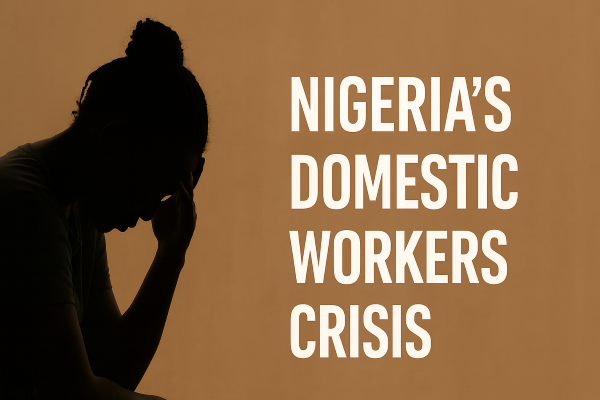
Domestic work remains one of Nigeria’s most essential yet most exploited labour segments—an unregulated ecosystem where millions of nannies, cooks, cleaners, caregivers and house-helps operate in the shadows, stripped of legal identity, bargaining power or workplace protections.
At the 7th Annual Criminal Law Review Conference in Abuja, legal experts, labour advocates and rights scholars made an urgent, unified declaration: Nigeria must formally regulate domestic work or risk deepening a national human-capital crisis.
Despite its enormous footprint in Nigerian households and its contribution to productivity, domestic labour still exists as an informal, invisible and vulnerable workforce—one where children are trafficked under the guise of “help,” adults work without contracts, and widespread abuse is normalised in silence.
Domestic Workers: Essential, Yet Invisible
According to legal scholar Mrs Ozioma Izuora of Baze University, domestic workers are omnipresent in Nigerian homes but absent from Nigerian law.
They remain “invisible,” with many suffering exploitation, starvation, assault, sexual violence and unpaid labour—despite constitutional protections and the Child Rights Act.
Shocking practices persist:
- Unlicensed agents rotate underage girls among households
- Workers sleep outside, are denied food or wages
- Abuses go unreported due to fear, ignorance or lack of channels
Izuora drew parallels with the highly successful Igbo apprenticeship model—proof that structured labour systems can create wealth and skills. Yet the government has ignored this model in formalising the domestic workforce.
Legal Experts: Domestic Work Is Work, Not Charity
For human-rights lawyer Hygenus Ibaga, domestic work is severely undervalued because Nigerians wrongly frame it as “helping a small boy or girl” instead of formal employment.
This mindset has destroyed accountability.
Despite constitutional guarantees of dignity, freedom and equality, domestic workers lack:
- Contracts
- Standard wages
- Working-hour regulations
- Social security
- Protection against arbitrary dismissal
Ibaga warned that Nigeria has not yet ratified the ILO Convention 189, which guarantees global labour standards for domestic workers—including rest periods, fair pay and safe work conditions.
Two previous Senate bills have now been merged into the Domestic Workers’ Protection Bill, passed by the Senate on Nov. 12, 2025. The House of Representatives has not yet passed it.
Weak Institutions, Cultural Norms Worsen Abuse
ROLDF project officer Linda Raji pointed to the deeper systemic rot:
- Recruitment is secretive
- Agents are unlicensed and unregulated
- Children as young as 14 are trafficked into households
- Domestic work is still viewed culturally as “not real work”
She emphasised the urgent need for:
- Safe reporting channels
- National awareness campaigns
- Minimum age of 16 for domestic employment
- Strong licensing of recruitment agencies
Without these, abuses will persist under the protection of informality.
Economists: Poverty, Hunger and Joblessness Fuel the Market
Human-capital specialist Dr Balogun Makanjuola highlighted the economic drivers:
- Poverty
- High out-of-school rates
- Unemployment
- Lack of opportunities
This surplus labour depresses wages to scandalous levels.
A graduate driver earns ₦30,000, Makanjuola noted—and “ten others are waiting to take the job.”
This imbalance gives employers unchecked power.
He warned that any domestic-worker legislation must account for Nigeria’s harsh economic realities or risk failure at implementation.
Moral and Ethical Imperatives Cannot Be Ignored
Islamic law scholar Mr Massoud Oredola added a moral dimension:
Domestic workers must not be overburdened or exploited, as compassion, fairness and humane treatment are central to leadership and faith.
He stressed that:
- Additional tasks should attract additional pay
- Employers must treat domestic workers with dignity
- Laws alone cannot replace moral responsibility
“Service to others is the rent we pay for our space on earth,” he said, urging Nigerians to embrace humanity as a national value.
BRANDECONOMY Insight
Nigeria’s domestic labour market is a multi-billion-naira shadow economy operating without structure, standards, or safeguards.
Formalising it is not just a legal necessity—it is a human-capital investment, a gender-rights reform, and a productivity enabler. Regulation, licensing, and legal clarity will:
- Reduce trafficking
- Protect children
- Boost employment quality
- Promote professionalism
- Increase worker productivity
- Improve household-level efficiency
BRANDECONOMY believes that a regulated domestic labour market can unlock human potential, empower women and girls, and align Nigeria with international labour standards.
Nigeria must now match moral outrage with political action.











